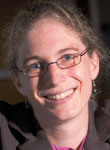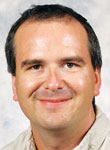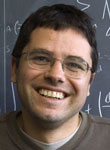Estroff, Cosley and Perelstein honored by NSF
By Anne Ju



Cornell faculty members Lara Estroff, Daniel Cosley and Maxim Perelstein have received 2009 Early Career Development Awards from the National Science Foundation.
The Faculty Early Career Development Program rewards junior faculty who "exemplify the role of teacher-scholars through outstanding research, excellent education and the integration of education and research within the context of the mission of their organization," according to the NSF.
Estroff, assistant professor of materials science and engineering, was awarded $465,000 over five years to study how polymer networks become incorporated into macroscopic, single crystals. Estroff hopes this work could lead to a new class of composite materials with potential applications ranging from new formulations of pharmaceutical drugs to materials for energy storage.
In the area of outreach, Estroff also proposes to help recruit and retain more women in her field at Cornell. She has started a new group called Women in Materials Science and Engineering, for example, with the goals of creating a supportive community among women in the department and introducing them to role models in industry and academia, as well as to increase the number of female undergraduate materials science majors at Cornell over the next five years.
Other outreach objectives in Estroff's proposal include educational programs for K-12, undergraduate and graduate students on biological and bio-inspired materials. She also plans to develop a course that will train engineering students in design of biomaterials, based on an understanding of such natural biominerals as bone, teeth and shells.
Cosley, assistant professor of information science, has received a five-year, $499,942 award for "Leveraging Online Behavior to Support Knowledge and Memory." He will combine computing and social science, gathering data about people's participation in such online communities as Wikipedia, the blogosphere and image-sharing networks, and use the results to encourage their participation, strengthen individuals' relationships with others in the community and give them personal feedback.
Cosley is the creator of the Wikipedia SuggestBot, which contacts contributors and suggests articles they might edit, based on their previous contributions. He hopes to refine the idea by, for example, developing algorithms to learn about not only the subject matter but also the kinds of contributions people make -- some are originators, some are editors, some are fact-checkers, and so on. The idea of noticing people's roles could be expanded to other kinds of communities, including the developers of open-source software, he suggested.
For individuals, he is developing an application called Pensieve (named for a magical device in the Harry Potter series) that will help people to reminisce by calling up ideas and images from their past postings and those of their online friends.
Perelstein, assistant professor of physics, received a five-year, $400,000 grant to support his work in particle physics. His proposal involves theoretical interpretation of data from the Large Hadron Collider (LHC) at CERN. The LHC experiments, which will begin data collection later this year, aim to answer such fundamental questions in physics as the origin of mass, the nature of dark matter and the structure of space at extremely short distances. Perelstein will focus on proposing and evaluating specific strategies to answer these questions from the massive amounts of data produced at the LHC.
Broader impacts and outreach will include organization of professional development workshops for K-12 science teachers, in collaboration with Lora Hine, outreach coordinator of the Laboratory for Elementary Particle Physics.
Perelstein also plans to document the history of how particle physics has changed society through technology transfer, and he hopes to explain how the unique environment of particle physics research has made these advances possible.
Media Contact
Get Cornell news delivered right to your inbox.
Subscribe